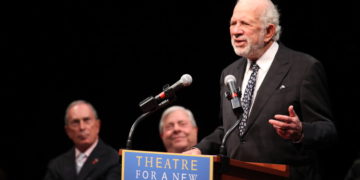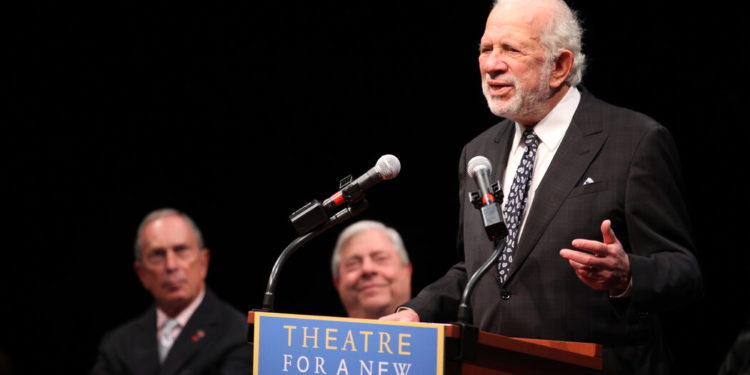Leonard S. Polonsky, a philanthropist who funded the arts and helped make significant historical artifacts and documents available to the public, including Sir Isaac Newton’s early papers and a letter from Christopher Columbus’s maiden voyage, died on March 14 at his home in Manhattan. He was 97.
The cause was diastolic heart failure, his wife, Georgette Bennett, said.
Mr. Polonsky made his fortune in the financial services sector, when his company, Hansard Global, a successor to one he founded in 1970, went public on the London Stock Exchange in 2006, earning him a profit of 99 million pounds. But his philanthropy began earlier, in 1985, when he started the Polonsky Foundation, in an effort to support the arts.
Among its many beneficiaries was the Theatre for a New Audience in Brooklyn, where Mr. Polonsky was born. The theater, which specializes in preserving, performing and studying the works of Shakespeare, received a gift of $10 million in 2013, and its venue was renamed the Polonsky Shakespeare Center.
In 2021, Mr. Polonsky made a $12 million donation to establish a new permanent exhibition at the New York Public Library on Fifth Avenue. Library employees spent three years sifting through 56 million artifacts in storage to identify 250 or so of the most awe-inspiring.
The resulting display, known as “The Polonsky Exhibition of the New York Public Library’s Treasures,” resembles a gilded curio shop of priceless items — among them, George Washington’s copy of the Bill of Rights (with 12 amendments instead of 10); Thomas Jefferson’s annotated version of the Declaration of Independence; a Gutenberg Bible; an Andy Warhol painting of a Studio 54 ticket; and stuffed animals that inspired A.A. Milne’s “Winnie-the-Pooh.”
The idea for the exhibition — which, as of June 2024, had attracted some two million visitors — emerged from a 2016 meeting Mr. Polonsky had with Anthony W. Marx, the president and chief executive of the New York Public Library.
Mr. Marx happened to show Mr. Polonsky a letter Christopher Columbus wrote in 1493, informing the Spanish royal court of land he had discovered. “The whole colonial enterprise was laid out in that letter,” Ms. Bennett, his wife, said in an interview. “Leonard said, ‘This is the New York Public Library — why am I the only one who’s seeing this?’”
Mr. Polonsky’s foundation also made it possible, in 2011, for the Cambridge University Library to digitize Isaac Newton’s early papers and an annotated first edition of his “Principia.” Beginning in 2012, the foundation funded a collaboration between Oxford’s Bodleian Libraries and the Vatican Library, resulting in the digitization of 1.5 million pages from early printed books written in Greek, Latin and Hebrew. And in 2014, it helped establish the Polonsky Academy for Advanced Study in the Humanities and Social Sciences, at the Van Leer Jerusalem Institute.
In a 2013 ceremony, Queen Elizabeth II named Mr. Polonsky a Commander of the British Empire for charitable services.
“Support for the arts seems so natural to me that it would be strange if I didn’t do it,” he said in “The Art of Being Leonard,” a 2010 documentary commissioned by his family.
Leonard Selwyn Polonsky was born on April 13, 1927, in Bay Ridge, Brooklyn, the eldest of three sons of Murray Polonsky, who owned a tobacco store, and Sadie (Futoran) Polonsky, who oversaw the home.
He attended Townsend Harris High School, in Queens, where students were required to take a version of the Ephebic Oath, which concludes, “I shall not leave my city any less but rather greater than I found it.”
After high school, he attended New York University, graduating when he was 18, in 1944. Following a year and a half of Army service, he traveled to Europe in 1947, basking in what he called the “curious intimacy” of postwar London and cultivating an interest in art in Paris.
The next year, he married Beata Herzfeld, who died in 1989. In addition to Ms. Bennett, whom he married in 2001, he is survived by three children from his first marriage, Alan, Marc and Nicole Polonsky; a stepson, Joshua-Marc Tanenbaum; six grandchildren; and four great-grandchildren. Toby, a son from his first marriage, died in 1986.
During his time in Europe, Mr. Polonsky studied at Oxford, where he earned a bachelor’s degree in literature, and the Sorbonne, where he received a doctorate in literature. He began his financial career in 1955, selling mutual funds in Rome.
He established his foundation in Britain, with the intent of democratizing knowledge and preserving international cultural heritage. Soon after, around 1986, he renounced his U.S. citizenship, in part for tax reasons, and settled in London, where he kept a home.
Well into his 70s, Mr. Polonsky retained his enthusiasm for learning. In 2002, he enrolled in a Ph.D. program in literature at the City University of New York, cramming for tests and writing term papers as he had done in his youth.
“He still needed to get straight A’s,” Ms. Bennett said. “And he did.”
The post Leonard Polonsky, Philanthropist Who Supported the Arts, Dies at 97 appeared first on New York Times.



















